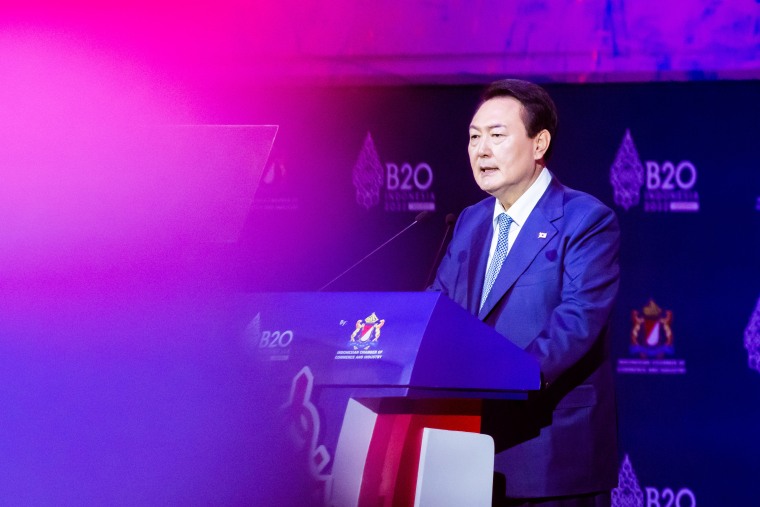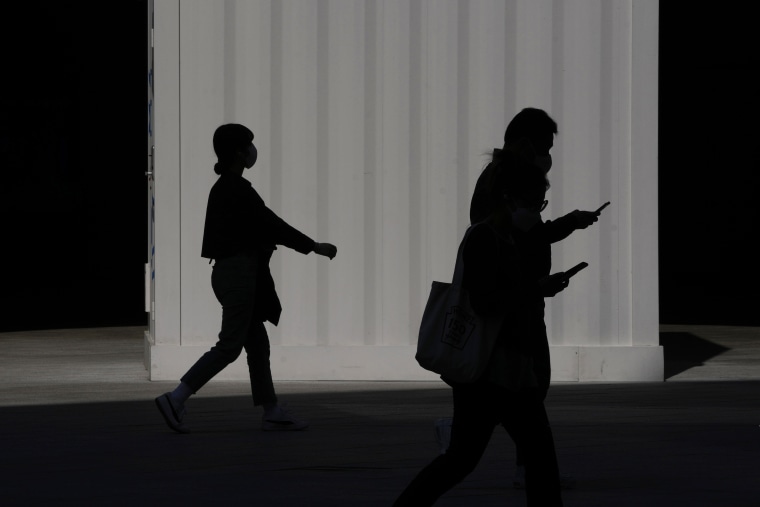SEOUL, South Korea — Lee Yunju has poked her head in the feminism aisle of the library at her university in Daegu, South Korea. But she is hesitant to do more than that.
“I feel cautious even picking up a feminist book,” said Lee, 22, a student in robotics engineering. “Lots of Koreans feel very antagonistic toward feminists and feminism, so we don’t even talk about it.”
Lee is one of 16.3 million people who voted for Yoon Suk Yeol this year as president of South Korea, a U.S. ally and the world’s 10th-largest economy. The country has long struggled to address gender inequality, ranking 99th out of 146 countries in the World Economic Forum’s 2022 report. Now, women’s rights groups and opposition parties worry the country’s gender inequality could worsen under the conservative government, saying Yoon has capitalized on anti-feminist backlash.
Experts say Yoon struck the biggest nerve among younger male voters by pledging to abolish the Ministry of Gender Equality and Family, arguing that discrimination is now an individual issue, not structural, and that the ministry no longer has reason to exist. The subject is one of the most polarizing of Yoon’s presidency, creating an uncertain future for a government body that supporters say is vital for promoting the rights of women, children and families.
In October, the Yoon administration unveiled plans for a new Health Ministry department that would absorb the functions of the gender ministry, part of a broader organizational shake-up that is now being considered by South Korean lawmakers.

“It is time for the country to shift from a paradigm of women’s policies, focusing on improving discrimination against women, to a paradigm of gender equality for both men and women,” Interior Minister Lee Sang-min said in the government’s announcement.
The plan may have difficulty passing in the national legislature, where the opposition Democratic Party has a majority. Public opinion polls on the issue are mixed, including among people Lee’s age.
“I don’t think any of my friends support keeping the ministry,” said Lee, who lives in one of South Korea’s most conservative regions, referring to both male and female friends. Lee said she felt ambivalent as well.
This ambivalence exists despite stark inequality in South Korea, where women, though highly educated, face the greatest wage gap of the 38 mostly high-income, developed member countries in the Organization for Economic Cooperation and Development.
In South Korea, women make up 19% of lawmakers, compared with 27% in the U.S. Congress, and 4.8% of executives at the country’s top 100 companies, according to a study by headhunting firm Unicosearch. There are currently three women in Yoon’s 19-member Cabinet.
Gender and feminism played an unprecedented role in the presidential election in March, which Yoon won by less than 1%, the closest in South Korean history. Both Yoon and his main opponent, Democratic Party candidate Lee Jae-myung, used gender issues to appeal to young voters who have become a crucial swing bloc.
Yoon, a former prosecutor, blamed feminism for the country’s low birth rate, said he would increase penalties for false accusations of sexual crimes, and denied the existence of “structural discrimination based on gender.” He accused the gender ministry of treating men like “potential sex criminals.”
“When Yoon became president, I felt devastated,” said Woo Ah-young, a 30-year-old office worker in Seoul who identifies as a feminist. “I’m not exactly sure what will happen in the future ... But I feel like my life will become more tiresome.”
Just five years ago, during the 2017 election, endorsing feminism was a bipartisan trend. Moon Jae-in, who won by a record 17 points, declared himself a feminist in his campaign, as did his conservative rivals. But by the end of his term this year, the tides had turned drastically. Anti-feminist voters, particularly young men in their 20s, emerged as a political force, rooting for Yoon and his People Power Party.
According to a 2019 survey by local news outlet SisaIN, 60% of men in their 20s showed a considerable to extreme aversion to feminism.
“They believe they are being discriminated against,” Cheon Gwan-yul, the journalist who led the survey, said at the time. Like opponents of feminism in other parts of the world, respondents argued that the movement promotes female supremacy and misandry.
“Aversion to feminism is shared across generations, but men in their 20s express it most aggressively,” said Park Jeonghoon, author of “There’s No Such Thing as a Good Man,” a book that discusses the anti-feminist backlash among young men in South Korea. “I think it’s because of a uniquely Korean situation: They have to go to the military.”
South Korea, which technically remains at war with neighboring North Korea, requires all able-bodied men ages 18 to 28 to serve at least 18 months in the military, causing delays in their education and early career that are perceived as giving women an advantage.
“I felt similarly in my 20s,” Park, now 34, told NBC News. “I was forced by the state to serve. I couldn’t resist against the state … I became angry that women weren’t going.”
Another common theory for the anti-feminist backlash points to Moon’s failure to curb youth unemployment and runaway housing prices, along with the rise in inequality.
“The sentiment now is, ‘Who took what’s mine?’” said Chung Hyun-back, a former gender minister for Moon. “People are frustrated with the economic inequalities and their worsening personal situations — where do these frustrations go? In some countries, it’s refugees or migrant workers. In South Korea, it’s the gender issue.”
To some, the gender ministry is a symbol of what they see as the excesses of feminism. In a public petition earlier this year that received over 50,000 votes, the ministry was described as being “unconstitutional” and “inciting gender conflict.”
“Maybe the ministry’s policies benefit women, but I don’t feel it as a man,” said Daniel Kim, a 33-year-old office worker in Seoul who agrees the ministry should be abolished but does not identify as anti-feminist.
The gender ministry was founded in 2001 under the Kim Dae-jung administration, South Korea’s first left-leaning government. For the past two decades, it has championed women’s rights, including playing a key role in the 2008 abolition of South Korea’s “hoju” system of family registration, which had been criticized as male-dominated.
The ministry has fewer than 300 employees and the smallest budget of any department: 1.47 trillion won ($1 billion), about 0.24% of all government spending. According to a study last year by the Korea Women’s Development Institute, 80% of that budget is allocated to family-related projects, including supporting single parents, while 9.2%t is used for victims of sexual and domestic abuse. Only 7.2% goes to policies specifically targeting women.
Supporters of the ministry say its work benefits a range of people, including men.
“Of course women in some classes, especially the upper levels, are well off, even superior to some men,” said Woo, the feminist office worker. “But women don’t live monolithic lives. There are different women in a variety of situations. The gender ministry aims to protect the marginalized in our society. This protection must continue.”
Chung, the former gender minister, said Korean society has benefited from discussing the ministry’s future: “People are now more aware of how important this gender issue is.”
